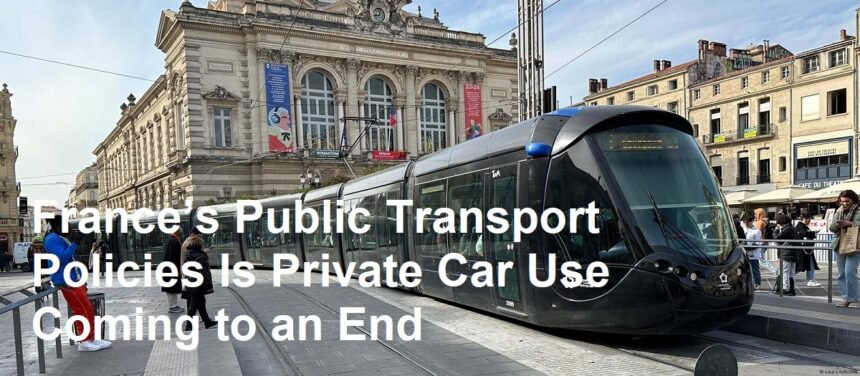Introduction: The Battle Between Cars and Public Transport
France is famous for its trains, metros, and bike lanes, but it’s also a country where private car use has been deeply rooted in daily life. Now, things are changing. With stronger climate goals, urban planning reforms, and political pressure from both local and EU-level authorities, France’s public transport policies are putting private cars under the spotlight.
The big question: will personal vehicles eventually lose their place in French cities, or will they adapt to coexist with cleaner, smarter public transport systems?
The Core of France’s Public Transport Policies
From Climate Goals to Daily Commutes
At the heart of France’s public transport policies lies a bigger mission: cutting emissions to meet EU climate commitments. This isn’t just about building more buses or metros—it’s about redesigning cities around people, not cars.
A Shift in Priorities
- Reducing traffic congestion
- Improving air quality in urban centers
- Investing in rail networks, trams, and electric buses
- Supporting active mobility like biking and walking
Car Restrictions in Paris: A Bold Example
How Paris Became a Testing Ground
Paris is leading the way with some of the most ambitious car restrictions. The mayor’s office has introduced:
- Low-emission zones that ban older, more polluting vehicles
- Pedestrian-first areas in historic districts
- Planned bans on diesel cars by the late 2020s
These restrictions on cars in Paris reflect a wider trend across European capitals, but the scale and ambition in France’s capital are particularly striking.
Reactions From the Public
While many residents welcome cleaner air and safer streets, others argue that small businesses and commuters are suffering. The political debate over urban transport policies shows just how emotional the car vs. public transport issue can be.
Green Mobility in Europe: France as a Leader
A Continental Movement
France isn’t alone. Across Europe, cities like Amsterdam, Berlin, and Madrid are embracing green mobility. However, France is playing a key leadership role by combining strict policies with heavy investment in public alternatives.
France’s Green Transport Strategy Includes:
- Expanding high-speed train lines to cut down short-haul flights
- Subsidizing electric buses for local transport
- Promoting bike-sharing programs in major cities
- Incentives for electric car adoption while discouraging unnecessary car trips
Urban Transport Politics: Balancing Mobility and Fairness
The Political Tug-of-War
The rise of urban transport politics means decisions about roads, metro expansions, and parking fees are no longer just technical—they’re deeply political. City governments face pressure to reduce emissions but must also ensure fairness for low-income families who depend on cars.
Challenges Policymakers Face
- Balancing city-center bans with suburban commuters’ needs
- Managing public pushback from drivers and small businesses
- Coordinating policies between national government and local councils
Practical Impacts for Residents and Travelers
If You Live in France
- Check your car’s emission rating: Older diesel cars are being restricted in more zones.
- Plan for multimodal commuting: Combining train, bike, and walking may become more efficient than driving.
- Leverage subsidies: From e-bike incentives to EV rebates, the government offers financial help for greener mobility.
If You Travel to France
- Expect fewer car-friendly areas: Tourists may find driving in Paris increasingly inconvenient. Public transport is usually the faster, cheaper option.
- Use apps for navigation: Many apps integrate metro, bus, and bike-sharing routes.
- Consider car alternatives: Trains connect most regions efficiently, often better than driving.
Common Questions on France’s Transport Future
Will Private Cars Disappear in France?
No, but their role will shrink. Private cars will likely be limited to cleaner models (EVs, hybrids) and used mostly outside dense urban areas.
Is Paris the Harshest City for Drivers?
Yes, Paris is among the strictest, but other French cities like Lyon and Strasbourg are introducing similar measures.
What About Rural France?
In smaller towns and rural areas, cars remain essential. Policies there focus more on upgrading bus routes and encouraging EV adoption rather than banning cars.
Lessons for Other Countries
France’s approach highlights a key lesson: successful public transport policy must provide real alternatives. Simply banning cars without strong infrastructure leads to frustration. But when clean buses, reliable trains, and safe bike lanes are available, people adapt more easily.
Conclusion: A Future Beyond the Private Car?
The debate over France’s public transport policies is really a debate about the future of urban life. While car restrictions in Paris grab headlines, the bigger story is how France is aligning with green mobility in Europe and reshaping urban transport politics.
Will cars disappear? Not entirely. But their dominance is fading. Public transport, cycling, and walking are becoming the backbone of modern French cities, while cars take a supporting role. For residents, commuters, and travelers alike, adapting early can save time, money, and stress.
What do you think—should France push harder to restrict cars in cities, or should private vehicles still play a major role in urban life?
Drop your thoughts in the comments and share this article with friends who are curious about the future of mobility in Europe!












